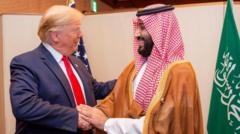With a keen focus on boosting the American economy, President Trump is gearing up for his much-anticipated visit to the Gulf region, aiming to secure financial commitments from Saudi Arabia, Qatar, and the UAE.
Trump Seeks Major Gulf Investments in the US During Upcoming Visit

Trump Seeks Major Gulf Investments in the US During Upcoming Visit
US President aims to solidify economic ties with Gulf states through new investment agreements.
With his trip to the Gulf states approaching, President Trump is looking to forge significant economic partnerships to bolster the US economy. His discussions with prominent Gulf leaders will focus primarily on attracting substantial investments from the region, particularly from state-backed sovereign wealth funds.
Economist Karen Young emphasizes the importance of high-profile investment announcements during Trump's visit, noting that he wants tangible outcomes that can be showcased to demonstrate his "America First" agenda.
Donald Trump is set to meet Saudi Crown Prince Mohammed bin Salman in Riyadh on May 13, continuing his journey with a summit involving Gulf leaders on May 14. This visit underscores the pivotal role of the Gulf region in Trump's economic strategy, being his first overseas trip of his second term—a notable deviation from the common practice of US presidents starting their foreign visits in allied western nations.
The growing economic relationship is particularly evident as the Saudi Public Investment Fund currently holds an 8.4% stake in Uber and has significant interests in other American firms. Given the economic backdrop, Trump's administration's push for wider investments from Gulf nations comes amid displeasure over new import tariffs that have adversely affected global trade dynamics.
As previously announced by Saudi officials, they plan to invest $600 billion in the US, with Trump reportedly advocating for this figure to escalate to $1 trillion. These ambitions may include military procurement agreements that could strengthen US-Saudi relations, especially given past tensions related to human rights concerns and international incidents.
This presidential visit is generating interest from major financial and technology sector leaders from Wall Street and Silicon Valley, solidifying the importance of these investment discussions. While long-term strategic partnerships are a goal, some experts suggest settling expectations, pointing out that immediate outcomes might not align with the projected figures.
Inside the anticipated agreements, reports suggest discussions might lead to a commitment from Saudi Arabia to purchase upwards of $100 billion in American defense systems, following a cooling of tensions that had previously stalled arms sales under the Biden administration.
The focus does not solely lie within military spending; the trip will also spotlight America's supremacy in cutting-edge technology, with significant opportunities emerging in sectors like artificial intelligence. The UAE's commitment to become a global leader in this arena emphasizes the urgency behind strengthening these technological ties.
In conclusion, the forthcoming discussions between President Trump and Gulf leaders will aim not only to draw financial backing for the US economy but will also serve to rejuvenate the relationship between the Gulf states and the US, providing mutual benefits as the Saudi kingdom continues to diversify its economic landscape away from oil dependency. The momentum leading up to this trip suggests that both parties see value in solidifying their longstanding partnership, poised to adapt to a rapidly evolving global economy.




















